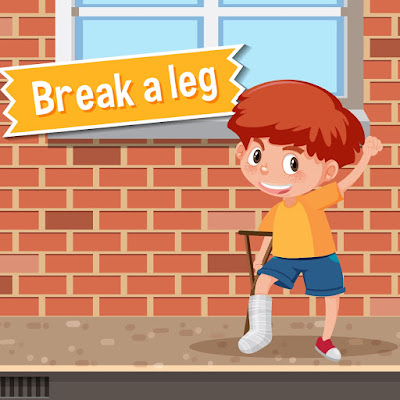Idioms: when you know the words but not the meaning
Have you ever entered a room full of people speaking English? Then, suddenly, you are confused: They are talking words you can understand but can't figure out the meaning of what they are saying.
Imagine your co-worker telling you: "Don't break a sweat on that report! You can get it fixed if you pull out an all-nighter."
Did you truly understand what she was trying to tell you?
At that moment, you feel you need some coffee to sharpen your mind and think about what your co-worker just told you.
You are walking to the cafeteria and find yourself in trouble because there is a new coffee machine, and it looks complicated to make it work. Another co-worker passes by, and she says: "Don't worry, right off the bat, you can tell is a tricky machine!" and offers to help you.
You accept the help but are clueless about what she said a minute ago: perhaps she wants me to hit it with a bat? You wonder.
That afternoon, you ride the bus to get back home, thinking about all the strange sentences you heard today with a frown on your face. The driver knows you, and he thinks you had a rough day.
What did he say to me?! Does he want me to fracture my leg? Really?
That night, you finish the report but keep thinking about the strange things you heard during the day. You are a curious person, and start searching for these phrases online, and voila! Here you are, in the right place.
The phrases you heard during the day are called Idioms and are a big part of the English language.
Idioms are phrases using figurative language with a particular meaning spoken by a specific group of people. When looking at an idiom, you need to understand the term within the context and not take each word literally. If I say: "under a cloud," it is not that a cloud is above me; instead, it means I am under suspicion of wrongdoing.
English has broad idioms practice. There is no specific rule about their use. The best way to get to know them is by reading and listening to conversations until you feel their meaning.
Let's go back to the phrases you heard during the day:
When your co-worker told you not to "break a sweat" over the report and "pull an all-nighter" to finish it, she meant:
- Don't worry about it, and if you work overnight, you'll fix it.
Now it's starting to make sense!
When your co-worker at the cafeteria said: " Don't worry, right off the bat, you can tell it is a tricky machine!" she meant:
- When you look at the machine, you can immediately notice is difficult to operate.
Ok, now you know: don't hit the coffee machine with a bat!
Finally, please don't get upset with your bus driver; he wished you good luck when he told you to break a leg with your project.
To some, idioms might be confusing; that could be true, especially if you are getting started with the language. I find them fun! I think idioms can be a colorful way of expressing ideas and can give you a more natural feeling when talking.
I invite you to embrace them! The more you make an effort to use them, you will feel a real advancement in your language skills.
So, when you return to the office and hear an expression that you can't understand, gather some courage and ask: can you help me understand this? I promise this is the best way of learning idioms and more often than not, you will find friendly people willing to help you.
I know gathering courage and asking this question is easier said than done; meanwhile, you can practice with my interactive idioms exercises while picking some. Click on the picture below, a new window will open, and you can access the idioms page.
Have fun practicing and stick around for more idioms activities!
Break a leg!





Comments
Emily, UK
Thanks for sharing.
Post a Comment